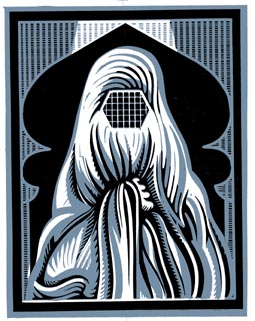RELIGION IN THE NEWS |
||
| Table
of Contents Spring 2002 Quick Links:
|
Grappling with
Islam:
Redressing a Grievance A year ago America’s highest-ranking woman fighter pilot took to the pages of USA Today to protest the Air Force’s regulations for female personnel venturing off base in Saudi Arabia. Maj. Martha McSally told reporter Edward T. Pound that in Saudi Arabia she "is treated like a Muslim piece of property." The black neck-to-toe robe called an abaya that she must wear "is a customary Muslim outfit for women, but I’m not Muslim and I’m not Saudi. I am a Christian." Nor did she appreciate having to ride in the back of a car or be escorted by men. Pound quoted opposing views, not only from McSalley’s male superiors but also from another female officer, Maj. Lisa Caldwell, who defended the regulations as allowing military women to "show respect for Islamic law and Arabic customs." Pound’s article drew only a modicum of attention from other news media. It was sufficient, however, to gain the backing of the Rutherford Foundation, the conservative legal outfit famous for representing Paula Jones in her case against President Clinton. On June 29 the San Diego Union-Leader reported that Rutherford president John Whitehead had written to President Bush and Secretary Rumsfeld calling the military policy an "unconstitutional and discriminatory violation of the equal protection and free exercise of religion rights of military women in Saudi Arabia." Whitehead said his concern had been "spurred by the plight" of McSally, for whom the policy was "not only discriminatory against women but also conflicted with her Christian beliefs." From the time the story broke until the end of October, Lexis-Nexis shows 14 articles on McSally’s protest in major newspapers and 13 television news segments. From November through mid-March, the numbers were 64 and 122 respectively. November was the month the Bush administration discovered that the easiest way to sell the war in Afghanistan was as a means to lift the Taliban’s oppression of Afghan women. So McSally’s cause sprang to life. On December 3 the lieutenant colonel (as she now was) filed a civil rights case against Secretary of Defense Donald Rumsfeld on the grounds of religious and gender discrimination. Ingrid Mattson, a professor of Islamic Studies and Christian-Muslim Relations at Hartford Seminary, harked back to McSally’s original comments in a December 15 op-ed in the Hartford Courant. "What does it mean to be a "Muslim piece of property?" Mattson asked. "McSally is showing her hatred not only for Saudi culture, but also for all Muslims." As far as Mattson was concerned, "there is an easy solution to McSally’s problems in Saudi Arabia—get out of there!" Justin Raimondo, editorial director of the website AntiWar.com, contended that McSally "combines the two absolute worst aspects of American political culture—rampant political correctness and foreign policy triumphalism—in one outrageous package." But these were voices crying in the wilderness. On Capitol Hill, Sen. Bob Smith (R-N.H.) declared, "[W]e are waging a war in Afghanistan to remove those abayas, and the very soldiers who are conducting the war have to cover up." In a letter to Rumsfeld, Rep. Louise Slaughter (D-N.Y.) informed the secretary of defense, "It is unconscionable that our own U.S. government should uphold this institutionalized disrespect of women by requiring that Americans conform to these standards." On January 20, McSally was the subject of an enthusiastic interview on CBS’s "60 Minutes" by Lesley Stahl. Being forced to wear the abaya, McSally said, "to me is defying Christ." The policy was an example of "where we separate our men from our women and we demean and humiliate just them." Two days after the interview aired, the Pentagon made a partial about-face, making the abaya rule, as the Washington Post put it, "not mandatory but strongly encouraged." "The mountain has moved," Whitehead told the Post, "but I don’t know how far." On January 30, McSally told Terry Gross of National Public Radio’s "Fresh Air," "I’m a fighter pilot and we tend to have an in-your-face, you know, type-A personality that, you know, raises issues and confronts them when they’re nonsensical." McSally was "entirely correct," said former Navy officer G.E. Mittendorf in a February 1 op-ed in the Washington Post. "We need more like her." On February 28, the government moved to have the case dismissed. On March 1, McSally and Whitehead appeared on NBC’s "Today Show," where McSally continued to attack any and all discriminatory policies towards military women in Saudi Arabia. She needed, she said, to "draw the line when those customs devalue people, and they treat them like property, and they—they cut good order and discipline in the military, and esprit de corps." Referring to the government’s motion to dismiss, Katie Couric asked, "Are you going to persevere and continue?" The motion, said Whitehead, was "based on some cosmetic changes that have to do with semantics more than anything." On March 2, the New York Times reported that the Pentagon had "rescinded policies requiring women in the military to sit in the back seats of cars and be escorted by men when outside their bases in Saudi Arabia." The mountain, it seems, had come to McSally. |
|